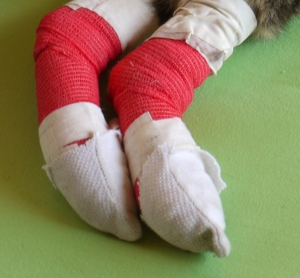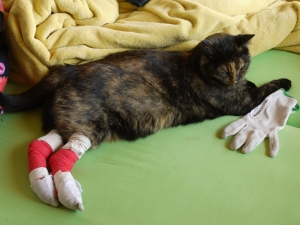You all know that in a perfect museum everything is at the right place at the right time. Unfortunately, this isn’t a perfect world, hence: no perfect museum. So, part of a registrar’s job is to improvise. Find bug fixes, workarounds and substitutes, use common sense and sometimes parts from your local DIY store. Often, you use your experiences from your everyday life to apply them to you museum work. Just now I discovered that it also works the other way round.
Recently, my cat fell from great height onto something very rough and hard, we suspect from a scaffold, roof or building crane to the asphalt road. As a result her back paws were torn open, she ruined her claws and lost two of them. The vet bandaged the legs, but when she tried to walk with it, she always slipped on our parquet floor. Well, as you might imagine from the accident, it isn’t my cat’s idea of fun to lie around doing nothing. So she kept on walking and slipping. That’s when my registrar’s brain started thinking…
Like most collections people I have a private supply of gloves: nitril, latex, cotton, leather… for every purpose the right glove. Among these are those handy little things most of you will know:
Not suitable for all purposes, for the little pimples on them are made from vinyl, but the right ones for carrying around something with a very smooth, slippery surface. In my case, it was the other way round: they should carry something on a slippery floor.
I sacrificed two thumbs to have improvised socks I could pull over the bandage.
Later I fixed them with some sticking plaster to hold them in place. Now, she still isn’t exactly a happy cat, she’s still a little insecure with the bandages (pun intended: she’s all thumbs with her rear legs…) but can walk around without slipping again.
Case solved.
Angela



My glove supply includes long gold lame gloves, for those artifacts where plain white cotton just won’t do.
________
Español:
Mi oferta incluye guantes largos guantes de lamé dorado, para esos artefactos donde el algodón común blanco no es suficiente.
Hi Randy,
LOL! Just added them to my list of gloves. I can imagine some cases! 🙂
Cheers!
Angela
________
Español:
Hola Randy,
¡Qué risa! Los acabo de agregar a mi lista de guantes. ¡Puedo imaginarme algunos casos! 🙂
¡Salud!
Angela
Great story! And I love the photos. My sister’s cat once fell from a 5th floor window, and we speculate from her almost complete lack of injury that she rode down on the window screen, which was found next to her.
Cheers!
Anne
__________
Español:
¡Grandiosa historia! Y amo esas fotos. El gato de mi hermana una vez cayó desde un piso 5, y especulamos sobre su casi total falta de lesiones, pues se deslizó encabalgada sobre la pantalla de la ventana que se encontraba a su lado.
¡Salud!
Anne
Thanks, Anne. OMG, I can imagine! Lucky cat!
Cheers!
Angela
________
Español:
Gracias Anne. Ay, Dios mío, puedo imaginarlo. ¡Pobre gato!
¡Salud!
Fernando
[Marked as spam by Antispam Bee | Spam reason: Server IP]
Cute! You solved the problem in a unique way.
Brilliant. You may be too young for this TV reference, but I call this doing a MacGyver. Or that I am Ms. MacGyver.
________
Español:
Brillante. Puede que tú seas demasiado joven para esta referencia de la televisión, pero yo llamo a eso hacerlo a lo MacGyver. O que yo soy la Sra. MacGyver.
Thanks, Laura! I know the series and I even use “to macgyver myself out of a situation” sometimes as a verb…
Cheers!
Angela
________
Español:
¡Gracias, Laura! Conozco la serie, e incluso he usado el verbo “macgyvearme” para salir de alguna situación…
¡Salud!
Angela
Terrific idea! Conservators are constantly required to improvise or “play it by ear,” so this was particularly meaningful to me (and I have had my share of dozens of cats over the years).
There’s a term used commonly in Guatemala (I don’t know if it is known in the rest of Latin America)- “chapuz.” It is the equivalent of “jerry-rigged” (probably British) and refers to a job done with improvised pr readily available materials and not much know-how. So this concept is well-known, perhaps especially in the third world, where formal education and funds for suitable materials are not abundant.
________
Español:
¡Es una idea fabulosa! Los conservadores están constantemente obligados a improvisar o a “tocar de oído”, por lo que fue especialmente significativa para mí (y mira que yo he tenido mi parte del asunto, con docenas de gatos en los últimos años).
Hay un término comúnmente usado en Guatemala (desconozco si existe en el resto de Latinoamérica): “chapuza”. Es el equivalente (probablemente británico) de realizar un trabajo con materiales improvisados y fácilmente disponibles, y sin mucho de “saber-cómo”. Así que este concepto es bien conocido, tal vez especialmente en el tercer mundo, donde la educación formal y los fondos para los materiales adecuados no son abundantes.
Thanks, Molly. We in Germany sometimes use the term “mit Bordmitteln” = “with what’s on board”, which derives from shipping. If you are on the ocean, you have no chance to fix something by buying the right supply. You just have to see what you’ve got and fix it with this. Common practice not only in the so called third world countries…
Cheers!
Angela
________
Español:
Gracias, Molly. Nosotros en Alemania algunas veces utilizamos el término “mit Bordmitteln” = “con lo que esté a bordo”, lo cual se deriva de la navegación. Si tú estás en el océano, no tienes oportunidad de arreglar algo comprando el repuesto adecuado. Solo puedes contar con lo que tengas. Es una práctica común no solo en los llamados países del tercer mundo…
¡Salud!
Angela